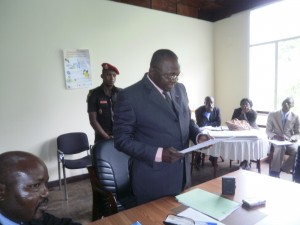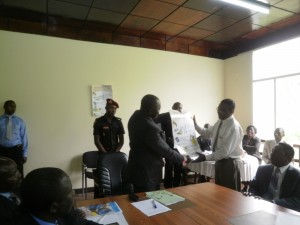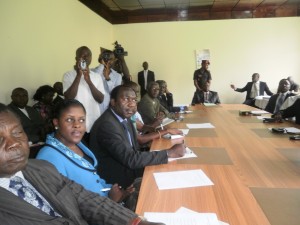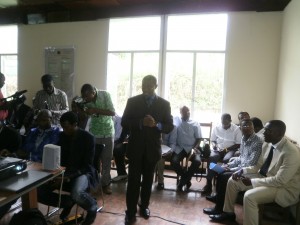By Walter Wilson Nana
Buea, Camerron
The government of Cameroon and her partners in the health sector are on a guard against epidemics in the country.
Recently, a national campaign was launched, with the objectives to prevent and fight against cholera and other diseases. In the Southwest Region, the Governor, Benard Okalia Bilai enjoined all to ensure good health for the population, while following the advice from the health experts within and out of the Region.
He recalled that in 2010, 3,204 cases of cholera were registered in the Southwest Region, with 42 persons losing their lives. “We pray that this should not repeat itself in our Region any longer. We praise the efforts of the intervention unit and wish that they should be fortified to do more,” Bilai said.

Southwest Governor, Bernard Okalia Bilai makes a call for all to ensure good health for the population
He made a plea to the stakeholders in Cameroon’s health sector; the government, her partners – WHO, UNICEF, PLAN CAMEROON, CARE CAMEROON and the communities to work in synergy and stop cholera and other diseases in the Region.
Southwest Regional Delegate of Public Health, Dr. Victor Mbome Njie said it is the responsibilities of all Cameroonians to be partners in the fight and prevention of epidemics. “It’s a collective responsibility. We’ve to remind ourselves of the need to carry on with the crusade to the population that there is a place for prevention,” he added.
In a presentation on the situation of cholera and other diseases of epidemic potential in the Southwest Region, Dr. Atembeh, Southwest Regional Chief of Immunisation in the Delegation of Public Health explained that prevention is the core of the ongoing campaign. “If we take adequate measures to wash our hands with running water, if we wash our hands after stool, if we wash our hands before and after eating, we’ll not be part of the cholera epidemic,” he noted.
Dr. Atembeh cautioned against eating anyhow and anywhere, saying these are areas to court epidemic diseases. “We should avoid eating food that has been exposed to flies, avoid defecating in streams because our faeces may be harbouring cholera and the person downstream will contract it, while using the water.”

Southwest Governor (L) hands over posters carrying tips on how to prevent cholera to Dr Victor Mbome Njie, Delegate of Public Health, Southwest
He prescribed the observation of basic hygiene rules as a way to avoid cholera. “In developed countries, cholera is a disease of the past because they observe basic hygienic regulations, in developing countries like ours, we’re prone to it because we have failed to respect the basic hygiene rules,” he mentioned.
The medic enumerated some risk factors of cholera outbreak. These include; doubtful water supplies, environmental concerns like people defecating in the bushes, improper food safety measures, cultural factors with people touching corpses, socio-economic factors, epidemiological factor, which is the movement of people and the non-observance of basic hygiene.
He also expressed worry on some of the inaccessible areas in the Region that hamper the flow of medical care in the case of an outbreak. “Part of our weaknesses in this fight are; insufficient sensitisation, intervention materials and late reporting of epidemics from our health districts.”

Stakeholders in the health sector, cameramen religiously follow a presentation at the launch in Buea
However, Dr. Atembeh was upbeat that despite the odds, they are ready to face the challenges with support from the Southwest Special Fund for Health, providing the necessary drugs, regular training of personnel to handle situations, the creation of regional training centres, the training of Red Cross officials to reinforce the team on the ground and the communication facilities now at their disposal.
Reports on other epidemics like Measles, Yellow Fever and Meningitis were given, in which the Medic noted that they were being closely monitored but the problem of inadequate epidemiological surveillance persists.
An open discussion closed the Buea launch in which participants resolved to be part of the prevention chain, while calling on the administration to crackdown on communities that do not respect sanitation guidelines.




